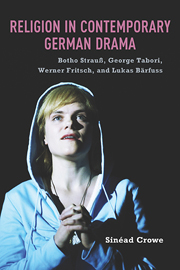 Religion in Contemporary German Drama
Religion in Contemporary German Drama Published online by Cambridge University Press: 05 May 2013
WONDREBER TOTENTANZ: TRAUMSPIEL and Aller Seelen: Traumspiel, two explorations of the National Socialist past set in or around his native Upper Palatinate region of Bavaria, are prime examples of the memory work for which Fritsch is best known. They both demonstrate the religiose quality that is also characteristic of Fritsch's theater, for religious elements pervade virtually all semiotic levels, from the titles, characters, and language to aspects of the mise en scène such as stage decoration, costumes, music, and lighting. In fact, the religious signs are too numerous to examine exhaustively in one chapter. This chapter therefore focuses on some representative examples, devoting special attention to the question of how religious signs are used to realize the programmatic aims discussed in the previous chapter.
Plot and Structure: The Dream-Play and the “Film of Life”
Wondreber Totentanz is a densely textured, multileveled theatrical reworking of Fritsch's earlier radio play, Isidor Isidor (1993), and novel, Stechapfel: Legende (Thorn apple: Legend, 1995). It interweaves a number of narrative threads and therefore, like much postdramatic theater, lacks the kind of linear plot that can be easily synopsized. The framework of the play — what Fritsch refers to as “die sichtbare Ebene” (the visible level)1 — is the funeral Mass of Irmgard, a young woman who has been killed in a terrorist attack while on honeymoon in Egypt (one of many references to Egypt in this play). Her widowed husband, Isidor, is present at the funeral, but he is in a coma and near to death himself as a result of the attack.
To save this book to your Kindle, first ensure [email protected] is added to your Approved Personal Document E-mail List under your Personal Document Settings on the Manage Your Content and Devices page of your Amazon account. Then enter the ‘name’ part of your Kindle email address below. Find out more about saving to your Kindle.
Note you can select to save to either the @free.kindle.com or @kindle.com variations. ‘@free.kindle.com’ emails are free but can only be saved to your device when it is connected to wi-fi. ‘@kindle.com’ emails can be delivered even when you are not connected to wi-fi, but note that service fees apply.
Find out more about the Kindle Personal Document Service.
To save content items to your account, please confirm that you agree to abide by our usage policies. If this is the first time you use this feature, you will be asked to authorise Cambridge Core to connect with your account. Find out more about saving content to Dropbox.
To save content items to your account, please confirm that you agree to abide by our usage policies. If this is the first time you use this feature, you will be asked to authorise Cambridge Core to connect with your account. Find out more about saving content to Google Drive.